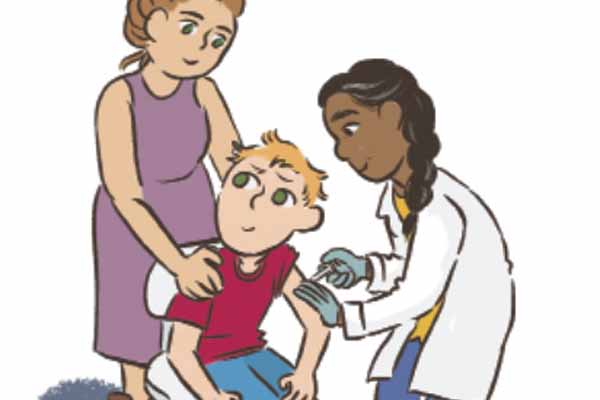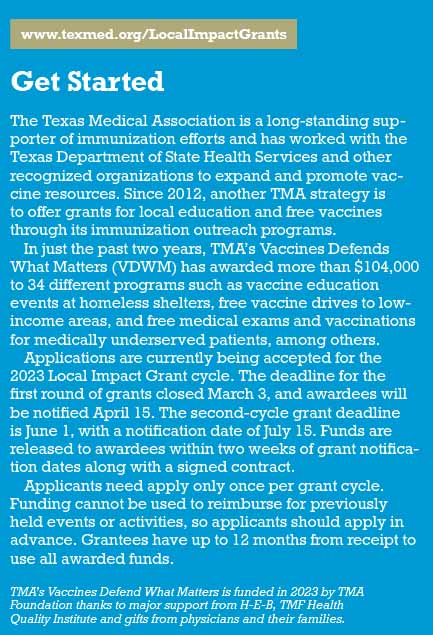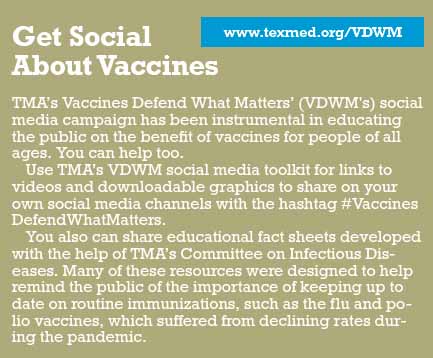
San Antonio primary care physician John Nava, MD says it’s “a constant battle” to educate patients, young and old, on the severity of vaccine-preventable diseases, especially when their hesitancy comes from the misunderstanding that vaccines do more harm than the diseases they help prevent.
“Some patients are too young to remember how terrible the effects of [now vaccine-] preventable diseases like measles and diphtheria are,” the president of Bexar County Medical Society (CMS) said.
To fight that battle, Dr. Nava knew his county medical society needed reinforcements. So, it turned to Vaccines Defend What Matters (VDWM).
A revitalization of the Texas Medical Association’s Be Wise – Immunize program, VDWM launched in 2020 as TMA’s integrated, multimedia public health education and advocacy effort to overcome vaccine hesitancy and increase vaccination rates in Texas. As an essential grassroots component of the campaign, Local Impact Grants became available in 2021 to help county medical societies, TMA Alliance chapters, medical student chapters, and member-physician practices combat vaccine hesitancy and low vaccination rates in their communities. (See “Get Started,” right.) Now three years in, those goals continue to become reality with the help of an annual grant from the TMA Foundation.
Before Bexar CMS became a grantee in 2021, Dr. Nava says resources for local vaccine drives were limited. A Sharpie, copier paper, and a card table “wasn’t very eye-catching,” he said.
Fresh funds then transformed Bexar CMS’ Ask a Doctor program with a new logo; a new camera to shoot vaccine education videos; and goodie bags containing masks, hand sanitizer, Band-Aids, and educational information on COVID-19 vaccinations and boosters.
The joint effort with the San Antonio Metropolitan Health District to raise local vaccination rates not only succeeded in promoting immunizations but also helped local physicians build relationships with patients who didn’t otherwise have one.
“It was a great utilization of funds,” Dr. Nava said. “We were able to attract people looking to speak with physicians one-on-one, many of whom are without health insurance and aren’t able to see a doctor regularly.”
If attendees were not vaccinated, on-the-scene physicians answered questions regarding their hesitancy; fielded questions and concerns about the flu shot; gave them documentation on the safety of vaccines; and at times, escorted them to the Metro Health vaccination clinic nearby for their COVID-19 vaccine or booster.
“Having the grant made the biggest difference,” Monica Jones, Bexar CMS chief operating officer, said. “It gave us the ability to promote our events, get our name out there, and show up for our community.”
Efforts like Ask a Doctor come as Texas experiences record-high levels of children behind on their routine vaccinations, and as much of the state falls into the “very high concern” category for delayed COVID-19 vaccine coverage as defined by the Centers for Disease Control and Prevention.
To help address these statewide vaccine challenges, VDWM prioritizes its Local Impact Grants for activities in Texas counties the Texas Department of State Health Services (DSHS) identified as having low rates of immunization and high rates of exemptions. Awardees are expected to use this funding to either provide vaccinations or promote vaccine education through community programs or events.
An opportunity for leadership
And physicians aren’t the only arm of medicine getting involved. Medical students have taken advantage of the opportunity to aid underserved patients and to take on a leadership role within their communities.
Maishara Muquith, a third-year medical student at The University of Texas Southwestern Medical Center, says the VDWM support not only keeps her Brother Bill’s Helping Hand student-run clinic afloat but also provides medical students in the area with critical training.
“It has been one of the most meaningful experiences during my time in medical school,” she said. “It gave me experiential service learning that I’m unable to get from clinical experience alone. It helped me learn a lot about working in community settings, and then I was also able to work with peers who had similar interests as me in community programs and development services. This grant is instrumental to developing student leaders.”
Brother Bill’s serves West Dallas and Oak Cliff, where a substantial portion of patients are uninsured or underinsured. The clinic started by offering COVID-19 and flu vaccines for free, but over the years, grew to offer the hepatitis B, shingles, and tetanus-diphtheria-pertussis vaccines as well.
The clinic also used the funds to create a culturally adapted education program in Spanish and English with information sheets for each vaccine the clinic offered. The education program included a 15-minute discussion with each patient about the benefits of vaccines and what barriers were stopping them from accessing immunizations.
Brother Bill’s also implemented pre- and post-visit surveys to assess changes in attitude and knowledge towards vaccines. This allowed the clinic to track how well its efforts fought vaccine hesitancy.
These surveys found that as many as 66% of Brother Bill’s patients received information about vaccines through news, social media, or friends and family, indicating their health care professional may not be their primary source for vaccine information.
Common barriers to receiving vaccines were lack of insurance, inconvenient hours, and distrust. Only 60% of patients survveyed stated they understood how vaccines worked before receiving the vaccine education provided in the clinic – after, that number jumped to 86%.
For Dr. Nava, that isn’t a surprise.
“People are hesitant about vaccines, especially the COVID-19 vaccine, because they think it’s brand new technology,” he said. “But in reality, the technology has been around for several decades.”
As doctors see higher rates of vaccine misinformation, VDWM’s efforts educate the public and keep programs like Ask a Doctor and Brother Bill’s Helping Hands clinic thriving.
“We would just not be able to offer adults in our area their routine immunizations without it,” Ms. Muquith said.

Meanwhile, hundreds of Spring Branch and Northwest Houston-area kids headed back to school last year all caught up on their vaccinations and well-child checks, thanks in part to VDWM.
And many of those kids walked away with brand new school supplies and a snow cone to boot.
Thanks to the TMA Foundation’s longtime support, VDWM and Be Wise before it have supported Spring Branch’s vaccine drive for the past three years. In 2022, Spring Branch Community Health Center hosted its annual Back-to-School Vaccine + School Supply Drive throughout the month of August. Children aged 5 to 18 were vaccinated against preventable diseases such as measles, mumps, polio, whooping cough, and diphtheria, among others. Human papilloma virus vaccinations were also given to adolescents and teenagers, and participants received vaccine-related education materials and school supplies.
Fewer Texas children received their required vaccinations during the pandemic. DSHS data show many kids are still behind. Not only did the Spring Branch event ensure children were able to satisfy school vaccination requirements in order to attend classes, but also it aimed to schedule as many well-child checks as possible, guaranteeing the children would receive preventive care along with their immunizations.
These kinds of drives allow physicians to provide comprehensive care to patients who might not regularly receive it, says Pasadena pediatrician Lindy Upton McGee, MD. She serves on TMA’s Committee on Child and Adolescent Health and is on the board of The Immunization Partnership.
They are “a great way to get people not only vaccinated but also back to their medical homes, especially those who have access-to-care issues,” Dr. McGee said. “Well-child checks are so important. They’re about development, health and nutrition, anticipatory guidance, physical exams.”
Between the vaccine drive and subsequent well-child visits, the health center was able to vaccinate 819 children for a total of 1,876 immunizations.
The event was an important way to provide care to a community in need, says Violet Shockley, a grant writer for the health center.
“The bottom line is that some of these families don’t have a regular doctor that they go to, so we try to use [the drive] to show them we are in the community. You don’t need to pay, you don’t need to have insurance. Just come get care as you need it, especially for the kiddos.”

Alisa Pierce
Reporter, Division of Communications and Marketing
(512) 370-1469